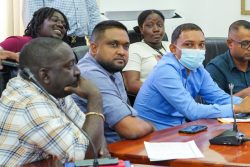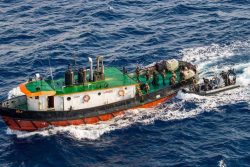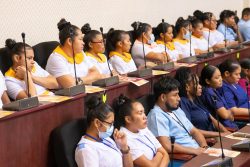“The inability of the system to meet the test of the law which the system itself has established,” is a major impediment to overcoming the crime and security challenges, notably the drug challenge, confronting Guyana and the rest of the region, Guyanese-born regional security specialist Dr Ivelaw Griffith told the Stabroek News in an interview on Monday last.
“The reality is that the overarching architecture of our societies is one of democracy and the rule of law which means that you have got to be able to win against the big fish in the courts,” Dr Griffith said.
And according to the Guyanese-born academic, the inability of government to secure convictions in major criminal cases

often has to do with – in large measure – the serious limitations in the criminal justice architecture. “You may suspect and know who the big fish are but you still have to bring the charges and have them hold up in the courts,” Dr Griffith said.
Dr Griffith, who has written extensively on security issues in the Caribbean including those related to the proliferation of drugs, pointed to the failure of “Guyana and other Caribbean countries” to successfully apply forfeiture legislature in drug-related cases. “Let’s look and see how many times there have been successful prosecutions under that legislation; while having the law is necessary it is not sufficient,” Dr Griffith said. He said that the ability to win against the big fish has to do with a range of other capabilities including those that have to do with coping with corruption in law-enforcement agencies and enhancing the capabilities of the courts to secure prosecutions.
The often perceived posture of fatalism in the Caribbean on the proliferation of drugs, drug-related criminality and attendant regional security issues has to do with the “recognition on the part of the political elite that the security concerns are overwhelming,” he said. Part of that recognition, he said, has to do with the fact that the capacity of the countries to deal with the drug problem is just not there. And so you have a combination of factors that sometimes lead to an impression of muddling through, a circumstance which he said was a result of the “overwhelming nature of the situation” and “the limitations on the part of the countries to deal with it. It is not simply that they do not want to deal with it. The reality is that it is overwhelming.”
Griffith told Stabroek News that the drug challenge confronting the region also extended into the realm of a scarcity of resources with which to meet the challenge. He pointed out that the need to direct resources in the direction of combatting the drug menace had to be seen in the context of other needs that exist elsewhere in Caribbean societies. The resources have got to be spread in a number of areas.
And according to Griffith, the security vulnerabilities in the Caribbean mean that it is not “in the national interest of the other Caribbean stakeholders to just let the situation be… I am talking about the United States of America, Canada, the European Union. I am also talking about South America. It is not in the interest of any stakeholder to let it be.”
Meanwhile, he said that the vulnerability in the regional security architecture also reposed in its dependence on bilateral and multilateral support. None of the other stakeholders – United States, Britain, Canada, the European Union, or the United Nations – have infinite resources so that the resources that are able to be lent to the Caribbean must also in some cases be lent to other countries. “The drug problem is not a North American/ South American/ Caribbean problem. It is a global problem so that the very few stakeholders with the capacity to give to the Caribbean also have to give to the other parts of the world where they have interests,” he noted.
Asked for an opinion on the major security issues confronting the region, Griffith said that while drugs and the attendant crime challenge are part of what he described as a “non-traditional” regional security ‘headache,’ “many Caribbean countries, including Guyana still have some traditional threats [like] border and territorial disputes. You may not hear about these all the time but Guyana still has a 15,000 sq kilometres dispute on its eastern front with Suriname and a five eights of the country’s 83 000 square miles on the western front [with Venezuela.] You may not hear about [the Guyana/Venezuela [territorial controversy] all the time until maybe a research boat is confiscated or an aircraft from Venezuela goes into Guyana’s airspace.”








